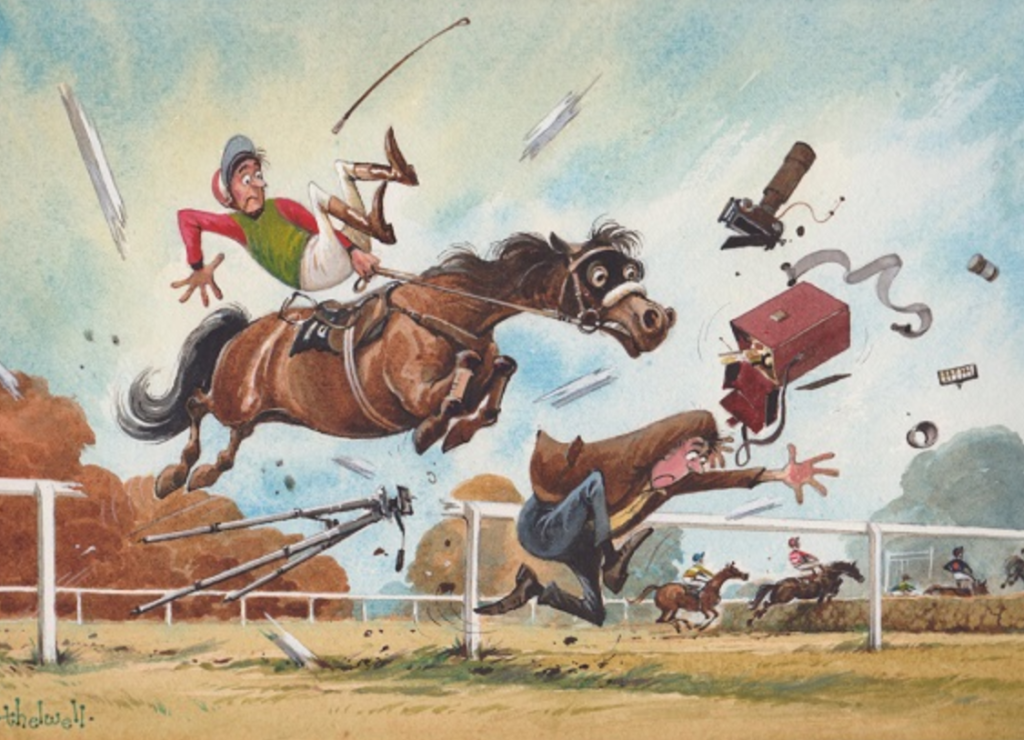Editor’s Note: Guest columnist Katrin Silva grew up riding dressage in Germany before moving to the United States at age 19 to learn to ride Western. She’s been riding both disciplines for the last twenty years. Read her article on Contact here.
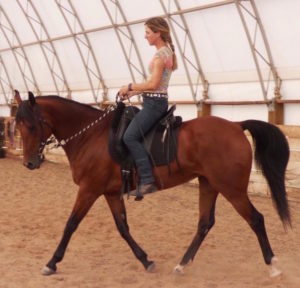
Katrin Silva
Silva has competed successfully through fourth level dressage on quarter horses, Morgans, Arabians, Hanoverians, and many other breeds. Based in New Mexico, she enjoys improving horse-rider partnerships and firmly believes that good riding is always good riding, no matter which type of tack a horse is wearing. Check out her blog here.
Drawings by Norman Thelwell. Check out this website dedicated to his iconic work.
By Katrin Silva
I may be a lapsed Catholic, but some concepts still ring true for me. Take the Seven Deadly Sins. Working with horses has taught me that these concepts still make sense. They won’t send you into eternal hellfire, but they 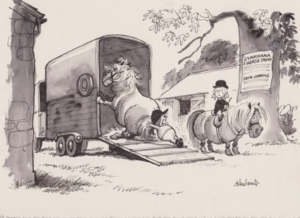 will keep you from acheiving a harmony-filled horse-human connection. A worse fate, for sure.
will keep you from acheiving a harmony-filled horse-human connection. A worse fate, for sure.
Greed
When your horse learns a new skill, be content with little at first.
Greed can sneak into your practice of any new movement or skill. Let’s say you’re teaching your horse to leg yield. After some trial and error, your horse finally takes a couple of steps forward and sideways. You feel elated. You’re excited to show off the new maneuver to anyone who is watching. You also want to make sure it wasn’t just a fluke, so you keep asking for more steps.
Pretty soon, one of two things happens:
- your horse loses interest in going sideways and starts to resist,
- your horse enjoys going sideways so much that he now uses it to avoid other things he knows but finds more difficult
Greed likes to disguise itself as diligence and dedication. Practicing something over and over works fine in golf or tennis, but in working with horses, greed is the enemy of progress. It’s easy to get greedy in training, especially with willing, talented 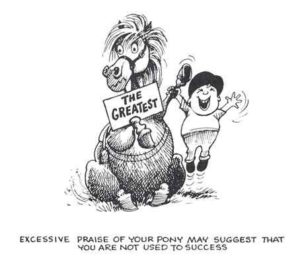 horses. Stay strong. Resist the temptation. Be happy with a little, reward often, take breaks before your horse forces you to.
horses. Stay strong. Resist the temptation. Be happy with a little, reward often, take breaks before your horse forces you to.
Envy
This green-eyed monster will suck all joy out of your horse time if you let it. Comparing yourself to other riders, and your horse to other horses, can be a positive thing because great riders make great role models. Participating in shows and clinics exposes us to the type of horsemanship we may want to practice. Watching a rider with truly soft, following hands and perfect body alignment can help fuel our ambition.
But those things can be a recipes for feeling less than satisfied with our own riding, and our own horse. I’ve slunk away from shows and clinics feeling like the world’s worst equestrian.
When you quit enjoying the here and now of your riding or quit appreciating your relationship with your horse you’re riding, 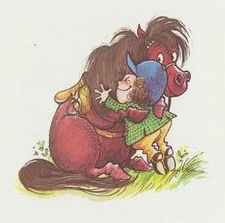 step back and walk away from envy.
step back and walk away from envy.
Lust
St. Augustine originally defined lust as “disordered love.” In horsemanship, disordered love takes the form of a smothering, misguided affection, which leads to a lack of clear boundaries between you and your horse.
Loving your horse means letting him be the best he can be. Rewarding him is great, but rewarding for random things at random times will only confuse him. Horses thrive on consistency. Many riders who claim to love their horses give them mixed messages instead: rewards for no reason, or rewards the horse does not perceive as a reward. Don’t go there – be clear, be consistent.
Gluttony
Overfeeding your horse is not kind and can lead to all sorts of equine health problems. Overfeeding yourself can have the same effect. Horses should not carry more than 20 percent of their weight. An average full-size horse weighs in around 1000 pounds, the average Western saddle about 30 pounds or more. Do the math and be considerate. Riding is more than sitting on top of a horse – 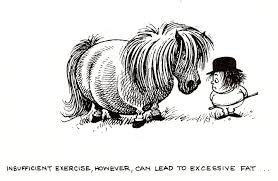 it’s a sport that requires physical fitness and body awareness. Do your horse a favor and get yourself into the best shape you can be.
it’s a sport that requires physical fitness and body awareness. Do your horse a favor and get yourself into the best shape you can be.
Sloth
Laziness is not working with your horse on a regular basis. There’s a difference between skipping a session for a legitimate reason and looking for all sorts of flimsy excuses to avoid getting on the horse.
A blizzard is legitimate, a breeze is not. Of course you shouldn’t ride a sick or lame horse, but often, some exercise, like hand walking, is better than none even then. Shortcuts are lazy, too:
- No, using a thinner bit will not make a horse’s mouth softer.
- No, using draw reins will not teach the horse to accept contact. There is no substitute for spending the time it takes to develop a responsive horse.
Wrath
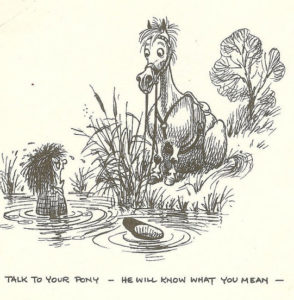 Good riders are calm riders. Horses can be good at testing human patience – so good that most of us have reached the limit of that patience at some point or other. But two minutes of anger can undo two years’ worth of careful training. Take a deep breath, or five, or ten.
Good riders are calm riders. Horses can be good at testing human patience – so good that most of us have reached the limit of that patience at some point or other. But two minutes of anger can undo two years’ worth of careful training. Take a deep breath, or five, or ten.
When all else fails, get off the horse. Kick a rock, or use the angry energy to clean a couple of stalls. It helps to think of your horse as a great Zen master – someone who helps you find you inner yogi.
Pride
Like Envy, pride can be a positive thing in small doses. Taking pride in what you do will make you want to do it better. But too much pride can keep you and your horse from making progress, or worse, get you hurt.
It’s ok to admit you don’t know something.
It’s to ask for help when things get difficult.
I wish I had sought the advice of my mentors sooner, and more often, when I was younger, instead of muddling through training issues by myself. It’s possible to problem-solve through trial and error, but sound advice from a professional you trust works much more quickly.
